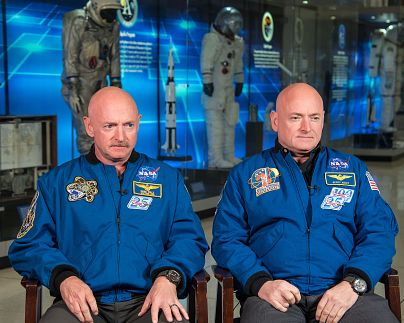After a ground-breaking space flight, an identical twin has slightly different genes from his brother.
A real-life space oddity: After a ground-breaking space flight, a NASA astronaut no longer shares the same genes as his identical twin brother.
The astronaut, Scott Kelly, spent a year aboard the International Space Station while his identical twin, Mark, remained on Earth. Now, NASA reports that the space mission had what appears to be a permanent, gene-altering impact on Scott Kelly.
"Mark and Scott Kelly are still identical twins; Scott's DNA did not fundamentally change," wrote NASA news chief Kelly Humphries in an email. "What researchers did observe are changes in gene expression, which is how your body reacts to your environment."
Scott Kelly spent 340 consecutive days in space from September 2015 to March 2016. When he returned to earth, NASA studied him in comparison to Mark and found that 7 percent of his genes had not returned to normal. Researchers don't know how long these changes will last.
"They may all return to normal after one or two years, or five years. We simply do not know," said Christopher Mason of Weill Cornell Medicine and the author of a study about the changes.
NASA scientists call those mutations in Kelly's DNA "space genes" and attribute them to the stresses of space travel.
Space genes is a new term and is still being defined. Mason suspects that a 7 percent disruption in gene expression after being back on Earth is neither high nor low. It's also not something entirely unseen before.
"This is the first experiment of its kind," he said. "Nonetheless, this number likely is within the range for humans under stress, such as mountain climbing or scuba diving."
Genes that turn on and off can have an impact on how cells function. Mason's team uncovered numerous health changes in Scott Kelly, including cells deficient in oxygen and cells that showed damage to mitochondria, a cell's energy powerhouse.
On the plus side, while he was in flight, Scott Kelly's telomeres lengthened. Telomeres, thought to be a marker of aging, typically shorten as we age. But once back on Earth, they returned to their previous length within 48 hours. The medical team believes many of these biological changes were caused by radiation and a calorie-restricted diet.
"This just shows how harsh the space environment really is on the body, and how important it is to do this research to prepare for upcoming, long-term space flights," said Dr. John Torres, an NBC medical correspondent.
The latest analysis looked at gene expression and found only a 7 percent change — this was an RNA change, not DNA. This change was minimal contrary to what many headlines are reporting and does not mean that the Kelly brothers are no longer identical twins.
Scott Kelly, who has spent more time in space than any other American astronaut, and Mark, who is also an astronaut, provide an unprecedented advantage to NASA doctors eager to learn how well humans can endure — in mind, body and spirit — long spaceflights.
In a series of ongoing studies, researchers from the National Space Biomedical Research Institute and NASA are comparing the Kelly twins with their (once) identical genetic code and their respective environments to spot changes in areas such as bone health, heart function, immune system and muscle weakness — all issues sure to affect a human's travel on a three-year mission to Mars.
NASA's Humphries teased that there's more revelations to come.
"We are at the beginning of our understanding of how space flight affects the molecular level of the human body," he wrote. "NASA and the other researchers collaborating on these studies expect to announce more comprehensive results on the twins studies this summer."












